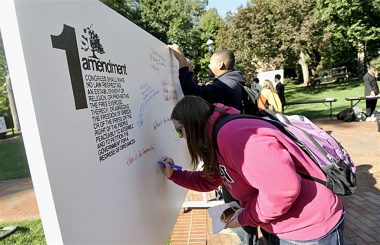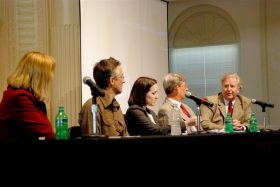First Amendment experts and advocates argued at length about whether corporations and individuals both share the same free speech protection and emphasized their optimism about the future of the First Amendment in an Internet-dominated age in a Sept. 29 panel discussion in Whitley Auditorium, one part of the larger daylong First Amendment Day celebration on campus.
Communications faculty members George Padgett, Brooke Barnett and Jessica Gisclair secured a Liberty Tree Campus Initiative grant that encourages universities to develop thought-provoking programs and invite nationally renowned speakers to help raise awareness of fundamental First Amendment freedoms on America’s college campuses.
The day also featured a College Coffee, First Amendment Boards, a Stand up and Speak Zone, the planting of a First Amendment Liberty tree and an evening address about the adventures of illegal art.
Most panelists agreed that corporations should enjoy fully protected speech, much the same as individuals do, and that the government should not be in the business of regulating what they can and cannot say.
“I worry a great deal about government regulation of speech in any way,” said Gene Policinski, the director of the First Amendment Center at Vanderbilt University and in Washington, D.C. “When government regulates speech, it does so very heavy handed.”
Sonya Garza, a faculty member in Elon University’s School of Law, said the Founding Fathers foresaw that there would be group speech, and that the First Amendment absolutely affords corporations speech safety.
“It’s dangerous for corporations not to be protected by the First Amendment,” Garza said. “When we talk about corporations, we’re also talking about non-profits, who often speak for citizens and franchises in this country. There is a danger in trying to regulate only a limited group of people and that leads to less speech.”

Mark Holser, a founding member of Negativland and advocate of copyright reform, disagreed, in large part, with his panelists. He took exception to the fact that businesses and people are recognized similarly under the law because the repercussions for either group are so different.
“Corporations have the same rights as a person, but they’re immortal,” Holser said. “They get all the perks of being a person but none of the responsibilities. A corporation’s job is to make money period, so the consequences don’t matter. What matters is you’re making money.”
The issue of businesses vs. individuals became a lynchpin of the discussion because of the case Citizens United v. Federal Elections Committee, which centers on attempts by Citizens United, a conservative nonprofit organization, to run commercials for its film “Hillary: The Movie” 30 days before primary elections in 2008. The FEC said airing the critical, one-sided promos would violate the McCain-Feingold Act.
Citizens United is arguing that the ads should be protected free speech. The case is currently under adjudication by the Supreme Court, but the eventual ruling could have a profound impact on the future of First Amendment rights in the United States.
“The issue in the Citizens United case applies not just to for-profits, but also to non-profit corporations,” said Katy Parker, the legal director of the North Carolina American Civil Liberties Union. “I’m happy (the ACLU) is protected by the First Amendment.”
The forthcoming result of the Citizens Untied case notwithstanding, all panelists expressed their optimism about the vitality of the First Amendment in the 21st century.
Policinski said the Internet, in particular, is the ultimate free speech tool, and the unencumbered discussion it allows might actually be “closer to the vision of the Founding Fathers.”
Burlington Times-News executive editor Madison Taylor lamented the proliferation of online commentary and blogging, but ultimately said the online outlet allows for greater debate. Garza agreed and added that a robust dialogue requires total First Amendment protection.
“The overarching debate is whether regulation by the government is better than more speech,” Garza said. “We just can’t regulate certain speech that we personally disagree with if we want to have a healthy debate in this country. We want to have debate on both sides. We want speech protected for all, not just for one side.”



